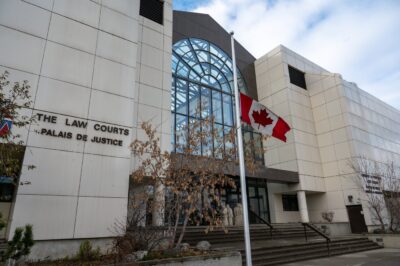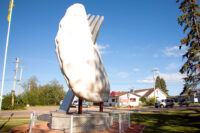Woman being sued for calling four others ‘pretendians’ says she’s protecting identity
By Canadian Press on August 26, 2025.

OTTAWA — A First Nations woman is being sued for calling four women “pretendians,” with the plaintiffs seeking more than $500,000 in damages and retractions to the heavily publicized comments made about them.
Michelle Christine Cameron, also known as Crystal Semaganis, who heads the Ghost Warrior Society, says she conducts research to safeguard community spaces designated for Indigenous Peoples and says those pretending to be Indigenous pose a real harm to communities and nations.
In the lawsuit filed in July to the Supreme Court of Yukon, Amanda Buffalo, Krista Reid, Amaris Manderschied and their mother Louise Darroch, say Semaganis conducted research into their backgrounds and concluded they are of Ukrainian heritage, not Indigenous, and then engaged in a “relentless” social media campaign against them.
Court documents say she is accused of calling them “‘grifters,’ liars and racists who exploit their falsely claimed Indigenous heritage for personal gain.”
The four women, three of whom hold positions working with or for Indigenous communities, are collectively seeking more than $500,000 in damages, as well as public retractions to the statements made by Semaganis.
The women, through their lawyer, declined to comment beyond what was contained in the statement of claim.
The lawsuit against Semaganis says beginning in late October 2024, Semaganis has engaged in a “relentless libelous campaign against the plaintiffs,” and that they have endured “significant harms to personal and professional reputations, serious psychological harms, loss of income, loss of academic opportunities and loss of business opportunities.”
The lawsuit says Darroch was adopted by a non-Indigenous couple, and was informed later in life she has Indigenous heritage.
While looking into the family — something Semaganis said she does only after she receives about 10 complaints from the public — the court document says Semaganis reached out to Darroch for information about her heritage, and she explained the adoption.
Semaganis, in turn, presented her with research that concluded she is of Ukrainian descent, and began broadcasting the information on her social media platforms — messaging the four women say is defamatory and want removed.
The Canadian Press has not seen or verified any of her research. None of the claims in the lawsuit have been tested in court.
Semaganis said she has not yet been formally served, but has received letters from the women’s’ lawyer to which she has not responded.
Semaganis, who did not want to comment on the specifics of the lawsuit, said it isn’t the first time she has faced legal action.
As a Sixties Scoop survivor, Semaganis said those lawsuits don’t deter her from doing what she does.
“If we are constantly bombarded by people with nefarious intent and with constant inauthenticity that comes with ‘pretendianism,’ then that puts our communities at risk,” she said.
“They’ve, quite frankly, gotten away with it for decades, and they’ve gotten quite comfortable in their stolen spaces, resources and platforms.”
The Sixties Scoop refers to a period between 1951 and 1991 where Indigenous children were systematically removed from their homes and placed under non-Indigenous care, resulting in a loss of culture and community connections.
Falsely claiming Indigenous identity “makes it harder for us to come back because there’s a lot of doubt in the communities now,” she said, referencing a number of high-profile cases that have seen the likes of Buffy Sainte-Marie and Mary Ellen Turpel-Lafond’s Indigenous identities brought into question. Those cases caused ripples through Indigenous communities who are growing wary of claims.
Semaganis said so-called “pretendians” use the Sixties Scoop trope to mask their inauthenticity, and use it as a defence when questioned about which nation they come from — and who claims them.
While Semaganis is confident in her abilities to research peoples’ genealogy, she called her field “unchartered territory” where she and the collective she works with are learning as they go.
“We realize that we’re not perfect, but we are setting a precedent. And we are doing work that is vitally needed by our people,” she said.
She also said if she’s presented with new information that contradicts her research, she acknowledges her error and informs community of the new developments.
The federal government uses a two-generation standard for issuing Indian Status cards. The Ghost Warrior Society has a broader standard for claiming Indigenous identity which includes an Indigenous ancestor you can identify within four past generations.
Last year, the Manitoba Métis Federation and the Chiefs of Ontario adopted a declaration condemning any person or group that “falsely claims” Indigenous identity for their own gain. The declaration says doing so furthers the marginalization of First Nations, Inuit and Red River Métis voices.
Other Indigenous leaders have spoken out about the issue, while the federal government has largely remained silent.
Still, community members like Semaganis have been steadfast in their efforts, despite public pushback.
“Every time a pretendian gets removed from their stolen spaces, then maybe Sixties Scoop survivors or Indian residential school survivors, or other people who were displaced and set aside for pretendians, can step into those roles they should have had in the first place,” Semaganis said.
This report by The Canadian Press was first published Aug. 26, 2025.
Alessia Passafiume, The Canadian Press
-31




